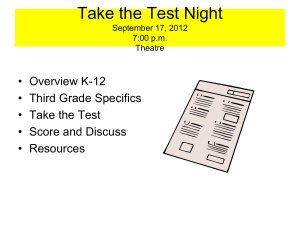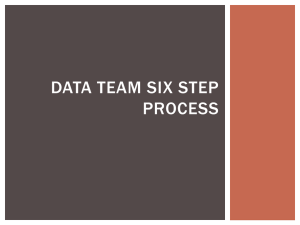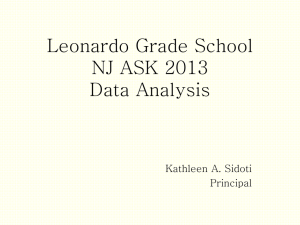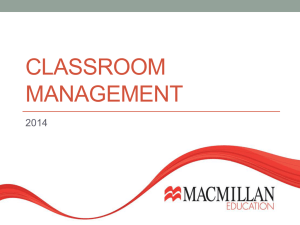What is a Charter School?
advertisement
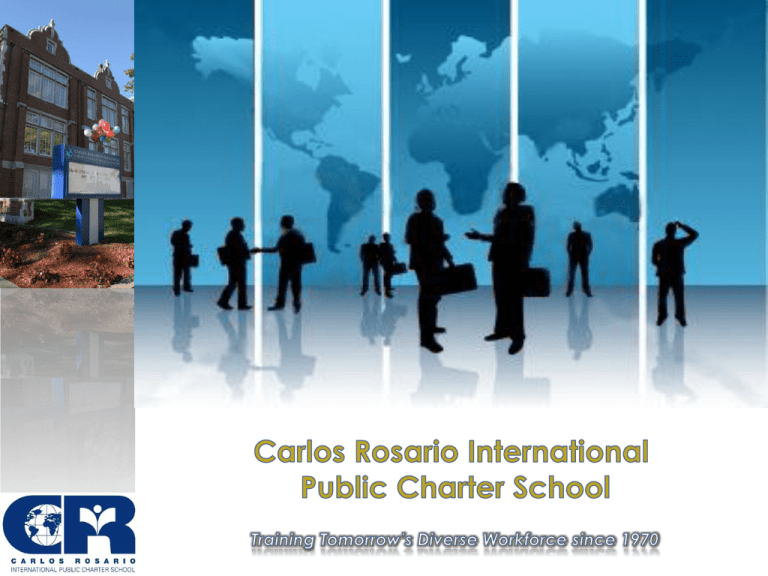
Our mission is to provide education that prepares the diverse adult immigrant population of Washington, DC to become invested, productive citizens and members of American society who give back to family and community. The school accomplishes this through excellence in teaching and learning in partnership with the community and by fostering a safe and compassionate learning environment. History • Began in 1970 as the community based organization, PEILA. • Named a national model for adult education by the US Department of Education. • The Phoenix Rising: Closed in 1996, reestablished in 1997 • Became the first adult ed charter school in the nation in 1998. • Served over 60,000 immigrants over its 42 years of operation. • Publically funded autonomous school, which has greater autonomy in exchange for greater accountability • Federal charter school law passed in 1992 • Each state elects whether to adopt a state level law to allow charter schools District of Columbia School Reform Act DC ST § 38-1802.04 (14) Program of education. -- A public charter school shall provide a program of education which shall include one or more of the following: (A) Preschool; (B) Prekindergarten; (C) Any grade or grades from kindergarten through grade 12; (D) Residential education; or (E) Adult, community, continuing, and vocational education programs. • Charter authorizer – Evaluates charter school applications – Awards and negotiates charter contract • (15 year contract in DC) – Monitors performance of charters – Can revoke the contract • Corporate Structure – 501 (c)(3) with Board of Trustees • Funding of Charters in DC – Per-pupil allocation – Adult ed charter receive a fraction – Funding based on enrollment – Enrollment audit – Must not dip below funded enrollment level • Annual Financial audits and reviews • Annual Enrollment audit • Compliance reporting (adherence to DC laws governing education & charters) • Reporting on attendance, retention, suspensions • Reporting on immunizations compliance • Accreditation required (in DC) • Regular In-depth Compliance & Performance Reviews – Student Achievement, Performance on Accountability Plans, – Curriculum, Assessment, Instruction, Climate, Governance, Financial Management, Compliance with applicable laws and regs • High stakes reviews (5, 10, 15 year mark) • 43% of public school children in DC • The first DC charter schools enrolled 160 kids in 1996 • Today over 35,000 students enrolled in over 100 campuses • Seven (7) adult education charter schools – Booker T. Washington PCS – Community College PCS – Education Strengthens Families PCS – LAYC Career Academy PCS – LAYC Youth Build PCS – Next Step PCS • • • • • • • • • Accountability Multiple reviews Student Achievement/Performance posted publically Risk of closure for lack of performance Funding tied to audited enrollment levels Autonomy Choose own curriculum, assessments Hire own staff (compared to traditional public) If a program strategy is not working, can turn on a dime • Responsible for finding, developing, maintaining own facilities • Relatively consistent, reliable annual funding Currently serving 2,200 diverse students through a holistic, three pronged model: 1. Foundational Skills and Literacy 2. Workforce Development Training 3. Comprehensive Supportive Service Basic Literacy ESL GED Content ESL; Health, Citizenship, ESL for Families, Computer Literacy Culinary Arts Computer Support Specialist (CSS) Nurse Aide Training • 2005 - Accredited by the Middle States Commission • 2009 – DC Public Charter School Board found Carlos Rosario as “exemplary” in all areas in the high stakes fifth year review 5% 1% 1% 20% 73% Hispanic Asian/Pacific Islander Black Caucasian (Non-Hispanic) Most staff and faculty members are bilingual and speak languages including Spanish, Amharic, Mandarin, Vietnamese, and French. • • • • • Holistic Approach Demand-driven Programs Corporate Advisory Committees Highly Qualified Staff and Faculty Commitment to Excellence • Matching scholarship opportunity • The Walmart Community Foundation Washington @ Work Initiative supports Carlos Rosario to provide Washington, DC residents with the skills and training needed to secure employment in highdemand industries • Culinary Arts • Nurse Aide Training • Computer Support Specialist Program • Customer Service • Overview of Food Service Industry • Basic Cooking Principles • Sanitation and Safety • Food Presentation and Garnish • Menu Planning • Table Services • Leadership • Teamwork TALENT • Communication • • • • • Instructional Hours: 110 hours Simulation Lab: 62 hours Practicum: 90 hours Employability skills, field trips Practice Certified Nurse Aide (CNA) tests • CSS 100-trains students to become A+ Certified • CSS 200-trains students to become Microsoft Certified Technology Specialist (MCTS) Internationally recognized credentials •Individual Counseling •Job Counseling / Job Placement •Job Readiness Workshops •Financial Aid Assistance • Life Skills Workshops •Vocational Counseling •Volunteer Services / Recruitment •Child Care and Health Referrals •Extra Curricular Activities •Student Government •Fundraising for Scholarships • Report Card: Accountability Plan Student Performance Report Card • Pilot Performance Management Framework (PMF) Carlos Rosario International Public Charter School New Pilot PMF Informational Chart MEASURES Description Programs Student Progress Educational Gain ESL(OrA-L6) Student Achievement Obtain Secondary Credential Assessment/Survey Utilized CASAS 2012-2013 Targets Spanish GED 100 & 200 students Supera GED 1 year grade level improvement on Supera (language) GED Official GED Test Highly proficient:70% ESL: 1 EFL improvement during school year Proficient: 60-69% Gateway a) Entered Employment: learners who enter program without a job, who then obtain a job after they exit the program. Exiting students from all programs (ESL, GED, Workforce). “Exit” includes b)Retained Employment: learners who either enter students who are the program with a job, or obtain a job after exit, and dropped without the remain employed in the 3rd quarter after program condition of “noexit. show drop”. Survey and data collection protocol in development. b)Highly proficient:60% Proficient: 50-59% Not proficient: less than 50% c)Highly proficient:73% Proficient: 63-72% Not proficient: less than 63% c)Entered Postsecondary: Students with a GED or HS diploma who successfully transition to occupational courses/or college from the adult education program. Leading Indicators Mission Specific Not proficient: less than 60% a)Highly proficient:68% Proficient: 58-67% Not proficient: less than 57% a)Attendance: participants attend classes regularly Attendance: Average daily attendance shown as a percentage b)Participants remain in the program long enough to receive pre-post assessments to measure learning gain. Retention: Percentage of program participants with both pre and posttest (regardless of gain). TBD TBD School SIS will provide the statistic. a)Highly proficient:69% Proficient: 60-68% Not proficient: less than 60% b)Highly proficient:65% Proficient: 55-64% Not proficient: less than 55% TBD TBD • Developing New Facility: Approx. 50,000 SF in NE DC, near the Rhode Island Metro Station. • Curriculum Upgrade: Aligning to DC region industry growth and student’s needs. • New University Partnership: Provide seamless transition into dual language degree for Culinary Arts grads. • Carlos Rosario Educational Foundation •Sonia Gutierrez’s 40th Legacy Campaign •Expansion and replication of the school’s model If you can imagine it, you can achieve it; if you can dream it, you can become it. - William Arthur Ward THANK YOU! Website: www.carlosrosario.org Facebook: www.facebook.com/CarlosRosarioSchool Twitter: @cr_school Sonia Gutierrez, President and Founder sgutierrez@carlosrosario.org Allison R. Kokkoros, Chief Academic Officer akokkoros@carlosrosario.org Ryan Monroe, Principal rmonroe@carlosrosario.org Patricio Sanchez, Director of Accountability psanchez@carlosrosario.org

